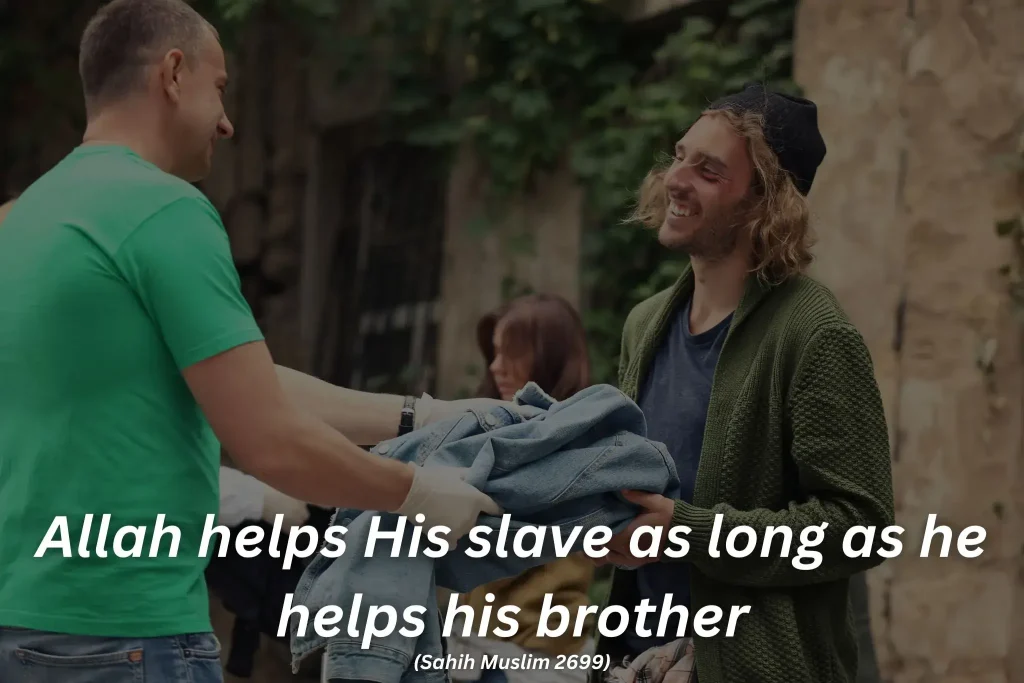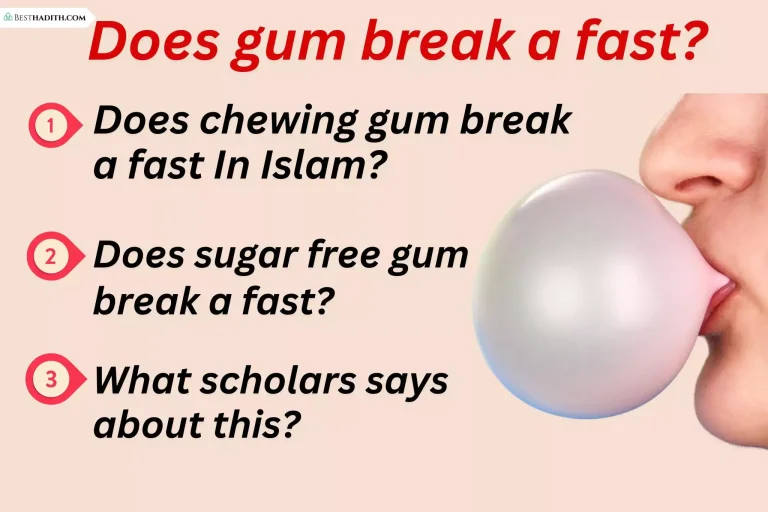6 Beautiful Hadith About Helping Others In Islam

6 Beautiful Hadith About Helping Others In Islam. There are tons of hadith where the Prophet (peace be upon him) talks about this! It’s just about being kind, fixing problems when you can…doesn’t matter who the person is. He said that’s what makes Allah happy, and helps us all live better together
Hadith About Helping Others In English
Abu Hurairah رضى الله عنه narrated that the Messenger of Allah (ﷺ) said:
“If anyone relieves a Muslim believer from one of the hardships of this worldly life, Allah will relieve him of one of the hardships of the Day of Resurrection. If anyone makes it easy for the one who is indebted to him (while finding it difficult to repay), Allah will make it easy for him in this worldly life and in the Hereafter, and if anyone conceals the faults of a Muslim, Allah will conceal his faults in this world and in the Hereafter. Allah helps His slave as long as he helps his brother.”
(Sahih Muslim 2699)
Explanation: Okay, there’s this hadith where the Prophet (peace be upon him) basically says this: help your Muslim brothers and sisters, and Allah will help you. Like, if someone struggling owes you money, give them a break, and Allah will do the same for you. Hide someone’s mistakes, and Allah hides yours. It’s kinda like good karma in Islam – what you put out, you get back.
Narrated Anas: Allah’s Messenger (ﷺ) said,
“Help your brother whether he is an oppressor or an oppressed,” A man said, “O Allah’s Messenger (ﷺ)! I will help him if he is oppressed, but if he is an oppressor, how shall I help him?” The Prophet (ﷺ) said, “By preventing him from oppressing (others), for that is how to help him.”
(Sahih al-Bukhari 6952)
Explanation: There’s this cool hadith where the Prophet (peace be upon him) talks about helping your brothers and sisters. Even if they’re the ones in the wrong! Someone asked how, and he said to stop them from doing the bad thing. Think about it – sometimes the best way to help someone is to stop them from messing up. It’s tough love, but it’s still love.
Sallam ibn ‘Amr reported from one of the Companions of the Prophet (ﷺ) said,
“Your slaves are your brothers, so treat him well. Ask for their help in what is too much for you and help them in what is too much for them.”
(Al-Adab Al-Mufrad 190)
Explanation: This teaching from one of the companions of the Prophet Muhammad (peace be upon him) tells us that our slaves, or those who serve us, should be treated kindly and with respect. They are like our brothers. We should treat them well, ask for their assistance when we need it, and also support them when they need help beyond their abilities.
Narrated Abdullah ibn Mas’ud:
If anyone helps his people in an unrighteous cause, he is like a camel that falls into a well and is pulled out by its tail.
(Sunan Abi Dawud 5117)
Explanation: There’s this hadith about helping people do wrong – the Prophet (peace be upon him) compares it to pulling a camel outta a well by its tail. Like, it won’t work, you’ll just hurt everyone! It means…sometimes “helping” is actually making things worse. We gotta be careful we’re not supporting stuff that’s not right, even if we mean well.
Narrated Al-Mughira bin Shu’ba:
I helped the Prophet (ﷺ) in performing ablution and he passed his wet hands over his Khuffs and prayed.
(Sahih al-Bukhari 388)
Ibn ‘Abbas reported that a man said,
“Messenger of Allah, my mother died without a will. Will it help her if I give sadaqa on her behalf?” “Yes,” he replied.
(Al-Adab Al-Mufrad 39)
Explanation: So, someone asked the Prophet (peace be upon him) if giving to charity would help their mom who passed away. She didn’t leave a will or anything. He said YES! It’s like…you can still do good stuff for loved ones even after they’re gone. Kinda cool, right? That’s a big thing in Islam – helping those in need, even if it’s for someone who died.
Hadith About Helping Others In Arabic

1st Narration
وَعَنْ أَبِي هُرَيْرَةَ - رضى الله عنه - قَالَ: قَالَ رَسُولُ اَللَّهِ - صلى الله عليه وسلم -
{ مَنْ نَفَّسَ عَنْ مُؤْمِنٍ كُرْبَةً مِنْ كُرَبِ اَلدُّنْيَا, نَفَّسَ اَللَّهُ عَنْهُ كُرْبَةً مِنْ كُرَبِ يَوْمِ اَلْقِيَامَةِ , وَمَنْ يَسَّرَ عَلَى مُعْسِرٍ, يَسَّرَ اَللَّهُ عَلَيْهِ فِي اَلدُّنْيَا وَالْآخِرَةِ, وَمَنْ سَتَرَ مُسْلِمًا, سَتَرَهُ اَللَّهُ فِي اَلدُّنْيَا وَالْآخِرَةِ, وَاَللَّهُ فِي عَوْنِ اَلْعَبْدِ مَا كَانَ اَلْعَبْدُ فِي عَوْنِ أَخِيهِ } أَخْرَجَهُ مُسْلِمٌ.
(صحيح مسلم ٢٦٩٩)
2nd Narration
عَنْ أَنَسٍ ـ رضى الله عنه ـ قَالَ قَالَ رَسُولُ اللَّهِ صلى الله عليه وسلم
” انْصُرْ أَخَاكَ ظَالِمًا أَوْ مَظْلُومًا ”. فَقَالَ رَجُلٌ يَا رَسُولَ اللَّهِ أَنْصُرُهُ إِذَا كَانَ مَظْلُومًا، أَفَرَأَيْتَ إِذَا كَانَ ظَالِمًا كَيْفَ أَنْصُرُهُ قَالَ ” تَحْجُزُهُ أَوْ تَمْنَعُهُ مِنَ الظُّلْمِ، فَإِنَّ ذَلِكَ نَصْرُهُ ”.
صحيح البخاري٦٩٥٢
3rd Narration
حَدَّثَنَا آدَمُ، قَالَ: حَدَّثَنَا شُعْبَةُ، قَالَ: حَدَّثَنَا أَبُو بِشْرٍ قَالَ: سَمِعْتُ سَلاَّمَ بْنَ عَمْرٍو يُحَدِّثُ، عَنْ رَجُلٍ مِنْ أَصْحَابِ النَّبِيِّ صلى الله عليه وسلم قَالَ: قَالَ النَّبِيُّ صلى الله عليه وسلم: أَرِقَّاكُمْ إِخْوَانُكُمْ، فَأَحْسِنُوا إِلَيْهِمْ، اسْتَعِينُوهُمْ عَلَى مَا غَلَبَكُمْ، وَأَعِينُوهُمْ عَلَى مَا غُلِبُوا.
الأدب المفرد ١٩٠
4th Narration
عَنْ عَبْدِ الرَّحْمَنِ بْنِ عَبْدِ اللَّهِ بْنِ مَسْعُودٍ، عَنْ أَبِيهِ، قَالَ مَنْ نَصَرَ قَوْمَهُ عَلَى غَيْرِ الْحَقِّ فَهُوَ كَالْبَعِيرِ الَّذِي رُدِّيَ فَهُوَ يُنْزَعُ بِذَنَبِهِ .
سنن أبي داود ٥١١٧
5th Narration
عَنِ الْمُغِيرَةِ بْنِ شُعْبَةَ، قَالَ وَضَّأْتُ النَّبِيَّ صلى الله عليه وسلم فَمَسَحَ عَلَى خُفَّيْهِ وَصَلَّى.
صحیح ال-بخاری ٣٨٨
6th Narration
وعن ابن عباس أن رجلاً قال: يا رسول الله، إن أمي ماتت بغير وصية، فهل ينفعها أن تصدق عنها؟ أجاب: “نعم”.
الآداب المفرد 39
Hadith About Helping Others In Urdu

ابوہریرہ رضی اللہ عنہ بیان کرتے ہیں کہ رسول اللہ صلی اللہ علیہ وسلم نے فرمایا: “جو شخص کسی مسلمان مومن کو دنیوی زندگی کی مصیبتوں میں سے کسی مصیبت سے نجات دلاتا ہے، اللہ تعالیٰ اسے قیامت کے دن کی مصیبتوں میں سے ایک مصیبت سے نجات دلائے گا۔ جو شخص اپنے مقروض کے لیے آسانیاں پیدا کرے (جب کہ اسے ادا کرنا مشکل ہو) تو اللہ تعالیٰ اس کے لیے دنیا اور آخرت میں آسانیاں پیدا کر دے گا اور جو شخص کسی مسلمان کے عیب کو چھپائے تو اللہ تعالیٰ اس کے لیے آسانیاں پیدا کرے گا۔ اس کے عیبوں کو دنیا اور آخرت میں چھپائے۔ اللہ تب تک اپنے بندے کی مدد کرتا ہے جب
(صحیح مسلم 2699)
انس رضی اللہ عنہ بیان کرتے ہیں: رسول اللہ صلی اللہ علیہ وسلم نے فرمایا اپنے بھائی کی مدد کرو خواہ وہ ظالم ہو یا مظلوم، ایک آدمی نے عرض کیا یا رسول اللہ صلی اللہ علیہ وسلم میں اس کی مدد کروں گا اگر وہ مظلوم ہو، لیکن اگر وہ ظالم ہو تو کیسے؟ کیا میں اس کی مدد کروں؟” آپ صلی اللہ علیہ وسلم نے فرمایا: ”اسے (دوسروں پر) ظلم کرنے سے روکنا، کیونکہ اس کی مدد کرنے کا طریقہ یہی ہے۔
(صحیح البخاری 6952)
حضرت سلم بن عمرو رضی اللہ عنہ سے مروی ہے کہ رسول اللہ صلی اللہ علیہ وسلم نے فرمایا: تمہارے غلام تمہارے بھائی ہیں، اس لیے ان کے ساتھ اچھا سلوک کرو، ان سے مدد مانگو جو تمہارے لیے زیادہ ہو اور مدد کرو۔ جو ان کے لیے بہت زیادہ ہے۔”
الادب المفرد (190)
مغیرہ بن شعبہ رضی اللہ عنہ روایت کرتے ہیں: میں نے رسول اللہ صلی اللہ علیہ وسلم کی وضو میں مدد کی تو آپ صلی اللہ علیہ وسلم نے اپنے گیلے ہاتھ اپنے خفیفوں پر پھیرے اور نماز پڑھی۔
صحیح البخاری(388)
عبداللہ بن مسعود رضی اللہ عنہ روایت کرتے ہیں: اگر کوئی اپنے لوگوں کی ناحق مدد کرتا ہے تو وہ اس اونٹ کی طرح ہے جو کنویں میں گرتا ہے اور اسے اپنی دم سے کھینچ لیا جاتا ہے۔
سنن أبي داود (5117)
ابن عباس رضی اللہ عنہما سے روایت ہے کہ ایک آدمی نے عرض کیا کہ اللہ کے رسول اللہ صلی اللہ علیہ وسلم میری والدہ کا انتقال بغیر وصیت کے ہوا، اگر میں ان کی طرف سے صدقہ کروں تو کیا اس سے کوئی فائدہ ہو گا؟ “ہاں” اس نے جواب دیا۔
الادب المفرد (39)
Conclusion:
Helping people is a HUGE deal in Islam! There are hadiths about it everywhere. They’re all about being kind, stopping bad stuff, making things better for everyone. Doing this isn’t just about following the rules – it’s about showing love the way Allah wants us to. It makes the whole world a better place!
Also, read Hadith About Love For the Sake of Allah In Islam.






